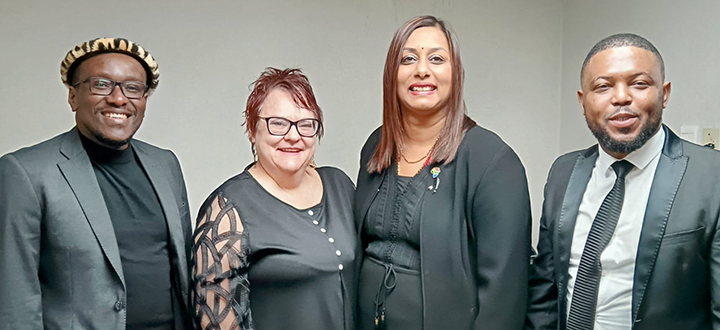News & Events
Unisa Law students gain a glimpse behind the scenes of their chosen profession
Ever wondered what it takes to sit on the bench or argue for justice in court? The Unisa Durban Black Lawyers Association Student Chapter (BLASC) answered that question at their much-anticipated Law Professions Day, offering students a glimpse into South Africa’s legal world.

Speakers, from right: Nkululeko Msiya (Senior Public Prosecutor – National Prosecuting Authority, Durban Cluster), Advocate Kuveshni Pillay (Advocate and Former Prosecutor), Magistrate Melanie de Jager – Pinetown Magistrate Court and IAWJ Coordinator, and Mpumelelo Zikalala – Zikalala Attorneys
Held on 26 April 2025 at the Unisa Durban campus, the event brought together law students, aspiring legal professionals, and seasoned lawyers under the theme “Keep the Torch Burning”. The morning was filled with inspiring talks, career insights, and thought-provoking dialogue.
Programme Director Zandile Dlamini opened the event, followed by a warm welcome from Sphesihle Mchunu, Chairperson of the BLASC Unisa Durban Branch. The first presentation was delivered by Vikela Ntlokwana, BLA KZN Head of Policy and Acting Judge of the Pietermaritzburg High Court. In his speech, “Wearing Many Robes: Reflections from Policy Work to the Bench”, he shared lessons from his multifaceted legal journey, emphasising the versatility and impact of a career in law.
Nkululeko Frank Msiya, Head Public Prosecutor of the Durban Cluster, offered a heartfelt presentation titled “Walking the Journey of Justice,” recounting his path from candidate attorney to senior prosecutor, and sharing guidance on pursuing a career within the National Prosecuting Authority. Magistrate Melanie de Jager’s talk, “What Magistrates Wish Young Lawyers Knew”, gave students a candid look into the responsibilities and challenges of serving on the bench, while urging them to embrace the gravity and honour of the role.
Advocate Kuveshni Pillay, in her presentation “From Prosecution to Advocacy”, encouraged students to face career transitions with courage and clarity, drawing from her own professional career. Mpumelelo Zikalala, who leads a black-owned law firm, shared personal insights in “Leading a Black-Owned Law Firm in South Africa”, tackling issues of transformation, perseverance, and leadership in the legal field. Wrapping up the presentations, Perusha Pillay-Shaik, a litigation specialist at Bowmans, delivered “Navigating High-Stakes Commercial Disputes”, offering practical strategies on conflict management and leadership in high-pressure environments.

The dynamic student team setting up for the Law Professions Day
An engaging Q&A session followed, where students posed questions on navigating ethical dilemmas, professional identity, and maintaining integrity under pressure, receiving candid, reflective responses from the speakers. The message of the day rang clear: the legal profession is more than a job — it’s a calling. And on 26 April 2025, that calling resonated through every corner of the Unisa Durban campus.
* By Jo Cossavella (with input from ChatGPT), Communications Officer, KwaZulu-Natal Region
Publish date: 2025/05/15
